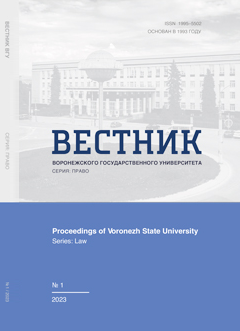Принципы «хорошей администрации» в сфере государственного контроля (надзора)
Аннотация
Исследованы принципы государственного контроля (надзора), составляющие «ядро» собирательного принципа «хорошей администрации»: законность, правовая определенность, добросовестность, запрет злоупотребления правом, соразмерность. При исследовании выбранных принципов анализировалась отечественная судебная практика, которая является незначительной в силу традиционной сдержанности судов в применении принципов административного права при аргументации принимаемых решений. В результате установлено, что судебная практика не вносит существенного вклада в развитие принципов «хорошей администрации». Для определения содержания исследованных принципов применялся сравнительно-правовой и межотраслевой подходы, также анализировалась эволюция принципов в процессе трех кодификаций контрольно-надзорного законодательства. Закрепление принципов контрольно-надзорной деятельности на уровне федерального закона создает условия для изменения их юридического значения как исключительно «идей», «ценностей» к восприятию как регулятора общественных отношений и одновременно ставит перед наукой административного права практическую задачу разработки как содержания, так и методики применения данных принципов.
Скачивания
Литература
2. Bazhanov A. A. Problems of the implementation of the principle of proportionality in judicial practice // Proceedings of the Institute of State and Law of the RAS. 2018. No 6. P. 124–158.
3. Belov S. A. Relevance and prospects of codification of administrative legislation in Russia // The Herald of the Supreme Arbitration Court of the Russian Federation 2011. No 12. P. 6–21.
4. Vasiliev R. F. Legal acts of governing bodies: textbook. Moscow : Moscow University Press, 1970.
5. Vinnitskiy A. V. The doctrine of subjective public rights vs the “state-management approach” in science // Law and politics . 2018. No 12. P. 27–40.
6. Vinnitskiy D. V. Integrity justified benefit, scope of exercise rights, or how russia’s tax law moved to the forefront of the against taxpayer’s vices // Statute. 2018. No 11. P. 44–57.
7. Volkov A. M. Protecting the subjective public rights of individuals in contesting cadastral value // Vestnik of the Moscow Finance and Law University. 2015. No 3. P. 210–218.
8. Gojman V. I. Offense and Legal Liability. General theory of law and state. Moscow : Jurist, 2002.
9. Gorshenev V. M., Shakhov I. B. Control as a legal form of activity. Moscow : Jurid. lit., 1987.
10. Gribanov V. P. The exercise and protection of civil rights. Moscow : Statut, 2003.
11. Gricenko E. V. The European good governance principle and perspectives of its perception in Russian law // Comparative constitutional review. 2013. No 2. P. 115–128.
12. Davydov K. V. Special principles of administrative procedures // Bulletin of the Nizhny Novgorod University. N. I. Lobachevsky. 2020. No 2. P. 129–130.
13. Dolzhikov A. V. The Constitutional Principle of Proportionality : A Legal-Dogmatic Method // Vestnik of the Perm University. Legal Sciences – Perm University Herald. Juridical Sciences. 2021. Issue 53. P. 540–561.
14. Zajkov D. E. Inadmissible appeals of citizens: problems of qualifications and law enforcement practice // Actual problems of Russian law. 2019. No 8. P. 69–71.
15. Zelentsov A. B. Subjective public law. RUDN. 2012.
16. Zyrjanov S. M. Administrative and legal status of an officer a controlling and supervisory body // Journal of Russian Law. 2019. No 9. P. 100–110.
17. Ilyin A. V. The principle of good faith is designed to break the rules // Statute. 2018. No 4. P. 7–16.
18. Kazbekova K. M. «Abuse of the right» and «Offense» : correlation of concepts // Problems of economics and legal practice. 2010. No1. P. 74–76.
19. Kornev V. N. Principles of law in foreign legal doctrine: nature, purpose and functions // State and Law. 2016. No 11. Р. 59–67.
20. Kornev V. N. Evolution of the Doctrine of the Principles of Law in Russian Legal Science // Legal Science and Practice: Bulletin of the Nizhny Novgorod Academy of the Ministry of Internal Affairs of Russia. 2018. No 1 (41). Р. 64–70.
21. Levonenkova T. A. State and municipal control (supervision): the search for effective solutions // Journal of Russian Law. 2014. No 9. P. 140–149.
22. Maximov I. V. Administrative penalties. Moscow : Norma, 2009.
23. Mitskevitch L. A., Vasilyeva A. F. State Control (supervision) in the Field of Business Activities and Administrative Responsibility: Criteria of Correlation // Laws of Russia: experience, analysis, practice. 2017. No 6. P. 39–43.
24. Mitskevitch L. A. Essays on the theory of administrative law: modern content. Moscow, 2015.
25. Morozova N. A. Invalidation of the instruction of the agency of state control (monitoring) due to impracticability thereof // Administrative law and process. 2015. No 5. P. 58–62.
26. Nam K. V. Development of the Good Faith Principle. Modern Stage. Internal Systematics // Vestnik of economic justice of the Russian Federation. 2018. No 7. P. 83–113.
27. Novoselov V. I. Legality of acts of governing bodies. Moscow : Juridicheskaja literatura, 1968.
28. Pisenko K. A. Methodological problems of the study of the principles of administrative law // Administrative law and process. 2011. No 3. P. 12–15.
29. Solovey Yu. P. Principles for the implementation of discretionary powers by the public administration // Administrative law and process. 2018. No 7. P. 5–15.
30. Solovey Yu. P. Judicial control over administrative discretion: Collection of articles «Public Law Yearbook 2015: Administrative Process». Moscow, 2015. P. 280–289.
31. Stakhov A. I. Actual problems of harmonisation of judicial reform with the reform of state control and supervision // Russian justice. 2019. No 3. P. 109–112.
32. Stakhov A. I., Mustafina-Bredikhina D. M. Analytical Review of Court Practice in Cases of Challenging Individual Administrative Acts of State Control and Supervision Bodies // Russian justice. 2020. No 3. P. 52.
33. Stepkin S. P. Problems of abuse of rights in exercising citizens right to apply to government bodies and local authorities // Journal of Russian Law. 2019. No 1. P. 54–59.
34. Studenikina M. S. Control and supervisory bodies in the executive branch: Collection of articles «Administrative Reform and the Science of Administrative Law». Moscow, 2007. P. 480–487.
35. Talapina E. V. Public administration: problems and prospects of legal regulation // Laws of Russia: experience, analysis, practice. 2015. No 3. P. 96–101 ; No 4. Р. 84–90.
36. Timoshina E. V., Kraevskij A. A., Salmin D. N. Axiology of judicial interpretation: means of weighing in the situation of competition of human rights // Vestnik of Saint Petersburg University. Law. 2015. No 3. P. 18.
37. Fogelson Yu. B. Principle of Good Faith in Russian Judicial Practice // Bulletin of economic justice of the Russian Federation. 2017. No 9. P. 103–116.
38. Shaykhutdinov E. M. Integrity as a General Legal Category: Problems of Application. // Legal technique. 2016. No 10. P. 479–481.
39. Sherstoboev O. N. The principle of legitimate expectations: foreign experience and the possibility of implementation in the system of administrative law of Russia, in: Public Law Year 2018: Principles of Administrative Procedures and Administrative Procedure. Moscow, 2018. P. 237–245.
40. Shorina E. V. Functions and principles of control in the Soviet state // Soviet state and law. 1969. No 11. P. 30–38.
41. Shtatina M. A. European standards of «good administration» and the development of Russian legislation // International expert seminar «The role of administrative justice in the protection of human rights.» December 14–15, 2009. M., 2010. Р. 26–34.
42. Yanev Yа. G. The rules of the socialist community (their functions in the application of legal norms). Moscow : Progress, 1980.
43. Detterbeck S. General administrative law with administrative procedural law. 17th ed. C. H: Beck. 2019.
44. Rottenwallner Th. Die Kontrolle durch die öffentliche Verwaltung - Systemschwäche zwischen Exzessen und Defiziten. DÖV. 2017. P. 143–180.
45. Schröder M. Verwaltungsrecht als Vorgabe für Zivil- und Strafrecht. VVDStRL. 1991. No 50. P. 196–232.










